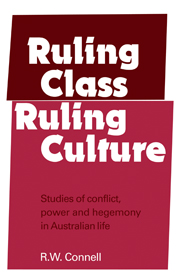Book contents
- Frontmatter
- Contents
- Table and Figures
- Preface
- Acknowledgements
- 1 Approach to class analysis
- 2 The idea of class in Australian social science
- THE RULING CLASS
- THE RULING CULTURE
- 7 Class consciousness in childhood
- 8 Class and personal socialization
- 9 The media and middle-class culture
- 10 The pattern of hegemony
- Notes
- Index
10 - The pattern of hegemony
Published online by Cambridge University Press: 05 January 2012
- Frontmatter
- Contents
- Table and Figures
- Preface
- Acknowledgements
- 1 Approach to class analysis
- 2 The idea of class in Australian social science
- THE RULING CLASS
- THE RULING CULTURE
- 7 Class consciousness in childhood
- 8 Class and personal socialization
- 9 The media and middle-class culture
- 10 The pattern of hegemony
- Notes
- Index
Summary
The problem of control
Socialists of the nineteenth century, though disagreeing in every conceivable way about how it should happen, were reasonably agreed that the collapse of capitalism would happen, and probably in their own lifetimes. A system so morally ugly could not last long. Marxists believed that it would be torn apart by its economic contradictions; syndicalists believed that it would be shattered by the militancy of organized labour; Laborites in Australia widely believed it would be ended by moral means, as the majority of people saw the obvious superiority of socialism.
And by any reasonable expectation, the capitalist system should have collapsed by now. It has stumbled into two frightful world wars and a disastrous depression, while working class parties have come to power, by revolution or election, in most of the countries that have been the centres of capitalism. But it has not collapsed. The hosts of Israel have compassed the city seven times, the economic trumpets have blown and the politicians have shouted with a great shout; but for some reason the walls have not fallen down. World capitalism is more productive, as vigorous, and arguably as well entrenched, as in the days of Marx and Engels. Even worse, the workers' movements have become infected with diseases that they once thought belonged to capitalism itself, ranging from bureaucratic inertia and a taste for minor privilege all the way to the policestate terror of Stalinism.
- Type
- Chapter
- Information
- Ruling Class, Ruling Culture , pp. 205 - 222Publisher: Cambridge University PressPrint publication year: 1977



